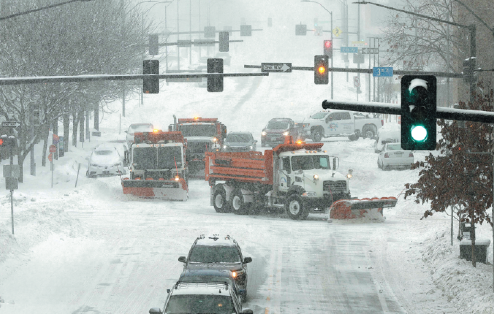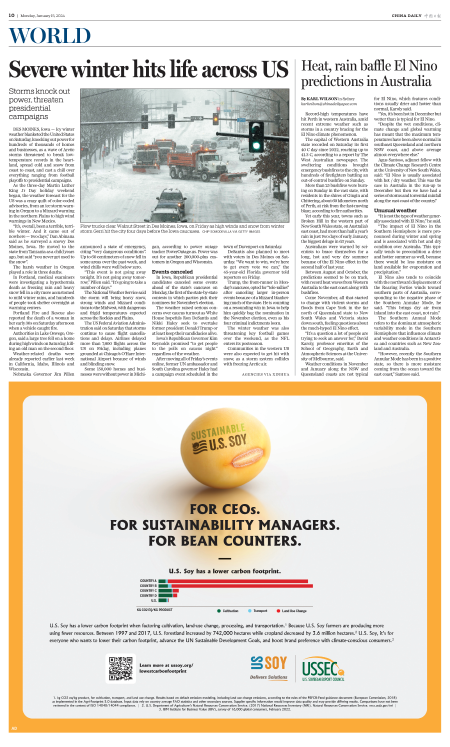
Plow trucks clear Walnut Street in Des Moines, Iowa, on Friday as high winds and snow from winter storm Gerri hit the city four days before the Iowa caucuses.
DES MOINES, Iowa — Icy winter weather blanketed the United States on Saturday, knocking out power for hundreds of thousands of homes and businesses, as a wave of Arctic storms threatened to break low-temperature records in the heartland, spread cold and snow from coast to coast, and cast a chill over everything ranging from football playoffs to presidential campaigns.
As the three-day Martin Luther King Jr Day holiday weekend began, the weather forecast for the US was a crazy quilt of color-coded advisories, from an ice storm warning in Oregon to a blizzard warning in the northern Plains to high wind warnings in New Mexico.
"It's, overall, been a terrible, terrible winter. And it came out of nowhere — two days," Dan Abinana said as he surveyed a snowy Des Moines, Iowa. He moved to the state from Tanzania as a child years ago, but said "you never get used to the snow".
The harsh weather in Oregon played a role in three deaths.
In Portland, medical examiners were investigating a hypothermia death as freezing rain and heavy snow fell in a city more accustomed to mild winter rains, and hundreds of people took shelter overnight at warming centers.
Portland Fire and Rescue also reported the death of a woman in her early 30s on Saturday afternoon when a vehicle caught fire.
Authorities in Lake Oswego, Oregon, said a large tree fell on a home during high winds on Saturday, killing an old man on the second floor.
Weather-related deaths were already reported earlier last week in California, Idaho, Illinois and Wisconsin.
Nebraska Governor Jim Pillen announced a state of emergency, citing "very dangerous conditions". Up to 60 centimeters of snow fell in some areas over the past week, and wind chills were well below zero.
"This event is not going away tonight. It's not going away tomorrow," Pillen said. "It's going to take a number of days."
The National Weather Service said the storm will bring heavy snow, strong winds and blizzard conditions to the Midwest, with dangerous and frigid temperatures expected across the Rockies and Plains.
The US Federal Aviation Administration said on Saturday that storms continue to cause flight cancellations and delays. Airlines delayed more than 7,600 flights across the US on Friday, including planes grounded at Chicago's O'Hare International Airport because of winds and blinding snow.
Some 150,000 homes and businesses were without power in Michigan, according to power outage tracker PowerOutage.us. Power was out for another 200,000-plus customers in Oregon and Wisconsin.
Events canceled
In Iowa, Republican presidential candidates canceled some events ahead of the state's caucuses on Monday, the first of the state-by-state contests in which parties pick their nominees for November's election.
The weather raised serious concerns over caucus turnout as White House hopefuls Ron DeSantis and Nikki Haley seek to overtake former president Donald Trump or at least keep their candidacies alive.
Iowa's Republican Governor Kim Reynolds promised "to get people to the polls on caucus night" regardless of the weather.
After moving all of Friday's events online, former UN ambassador and South Carolina governor Haley had a campaign event scheduled in the town of Davenport on Saturday.
DeSantis also planned to meet with voters in Des Moines on Saturday. "We want to win, we're here to get every vote we can," the 45-year-old Florida governor told reporters on Friday.
Trump, the front-runner in Monday's caucuses, opted for "tele-rallies" after canceling larger in-person events because of a blizzard blanketing much of the state. He is counting on a resounding win in Iowa to help him quickly bag the nomination in the November election, even as his four criminal indictments loom.
The winter weather was also threatening key football games over the weekend, as the NFL enters its postseason.
Communities in the western US were also expected to get hit with snow, as a storm system collides with freezing Arctic air.

